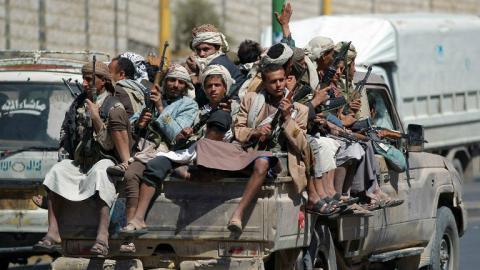Yemen - who's running the country?
Ask a Yemeni who is running the country and you’ll likely get this answer:
"President Hadi is confined to his palace since the Houthis took control. Abdelmalik al-Houthi [leader of the Ansarallah – Houthi group] is the de facto ruler and he’s ruling from his northern stronghold of Sadaa."
These views are widely held and are denting the image of President Abd-Rabbu Mansour Hadi and that of Yemen.
Now he’s appointed pro-Shia Houthis in key security positions. Many here think Hadi “has given Yemen to the Houthis on a silver platter”.
And that’s slowly building up anger in Yemen.
For the first time since the crisis began in July, when Houthis, Shia Zaydis, started their march to grab most of Yemen, hundreds of anti-Houthis took to the streets on Saturday in Sanaa, Taiz and other areas. They called on Hadi to leave.
The president is weak. He has no influence. His military is divided along tribal and political loyalties.
The rumour is that the military is still loyal to the deposed president, Ali Abdullah Saleh, which is why the Houthis’ rise went largely unopposed. Saleh is widely seen as actively backing the Houthis.
Hadi’s government is even weaker than the president himself. The ministry of information was stormed last week by armed Houthis .
A minister complained that the fighters were using her office and photocopied all of her documents. She was told days earlier that, "you won’t be able to appoint anyone [in state owned media] that’s not a member of Ansarallah."
The Houthis are now calling the shots in nearly all the state’s institutions and nothing can be done without their consent.
But some say Hadi should not be discounted.
"Hang on, it’s not what you see," one colleague told me. "Don’t underestimate the state or Hadi."
Hadi wants to get rid of his opponents.
He’s asked the US and UN to put deposed president Saleh on the UN sanctions list – freezing his assets. Hadi is trying to get Saleh out of the country.
Hadi allowed the Houthis and Saleh to get rid of the Islah Party – the political front for the Muslim Brotherhood – and some of the powerful figures close to it, who enjoyed huge influence in Yemen for decades.
Ali Mohsen al-Ahmar, a longtime army general, is close to the Muslim Brotherhood. He is an enemy for the Houthis and Saleh.
He led all of the states’ six wars under the Saleh government against the Houthis. He also sided with the mass protests that led to the toppling of Saleh in 2012.
Hadi could be relying on time and the rising anti-Houthi sentiment. And perhaps wait for the right moment to fight the Houthis once he sorts out his military and gets rid of his opponents.
Other critics of Hadi suggest he could be giving in to the Houthis to secure the presidential seat – that’s probably originating from the Saleh supporters.
Hadi and Saleh are now enemies. The latter wants Hadi out of the General People’s Congress – the country’s biggest party, chaired by Saleh.
It’s all part of a an internal and regional political game, and the people of Yemen are paying the price.
Al-Jazeera




